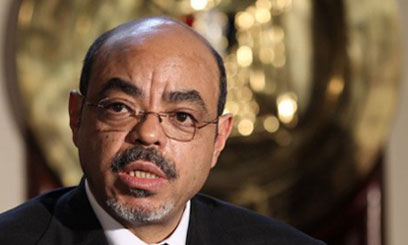Meles, a former rebel fighter who came to power in 1991 after toppling the bloody dictatorship of Mengistu Haile Mariam, had not been seen in public for two months, and had been reported to have been sick in a hospital in Brussels.
“Prime Minister Meles Zenawi passed away yesterday evening at around midnight,” said government spokesman Bereket Simon.
“He has been struggling to be healthy in the last year… one of the best things about him was that he never considered that he was ill and he was up to the job every time, every day, every evening.”
Meles, who was 57, had last been seen in public at the G20 summit in Mexico in June. Bereket would say only that he had died “abroad”.
“He had been recuperating well, but suddenly something happened and he had to be rushed to the ICU (intensive care unit) and they couldn’t keep him alive,” he said.
Deputy Prime Minister Hailemariam Desalegn, 47, will take over interim power.
“According to the Ethiopian constitution the deputy prime minister will have to go to parliament and take the oath, and the government is organising the parliament to be summoned as soon as possible,” Bereket said.
Hailemariam, 47, has been deputy prime minister and foreign minister since 2010, and was previously special advisor on social affairs to Meles.
Unlike many core members of the ruling party, he does not hail from the far north of the country but from the Southern Nation, Nationalities and People’s Region, the most populous of Ethiopia’s nine ethnic regions.
Ethiopia has declared a state of national mourning, but has not fixed a date for a funeral, said Bereket, adding that “everything is stable” in Ethiopia following the news.
Diplomats and analysts in Addis Ababa say it has not been clear how the government has been run since Meles was reported to have fallen sick in June.
The position of president is largely honorific and Meles, a former rebel fighter who came to power in 1991 after toppling the bloody dictatorship of Mengistu Haile Mariam, held the real political power.
Kenyan Prime Minister Raila Odinga told the BBC that Meles had been “a great leader” but said he also “fears for the stability of Ethiopia upon his death.”
“The Ethiopian state is very fragile,” he said. “I don’t know if they have sufficiently prepared for his succession… but one would hope they could contain the various factions within the government so that the transition is smooth.”
On paper, Meles’s government has fostered a policy of ethnic federalism, devolving significant powers to regional, ethnically based authorities, but central control remains firmly in the hands of the ruling party.
But his death also leaves a major power gap in the Horn of Africa, with Ethiopia playing a key role in the fortunes of many of its neighbours.
Ethiopian troops invaded Somalia for a second time last year – after a US-backed invasion in 2006 – and Ethiopia is supporting the fight against Somalia’s Al-Qaeda-linked Shabaab insurgents.
Meles’s death could also potentially see changes in the relationship with arch-foe Eritrea, which split from Ethiopian rule in 1993 before the two spiralled into a bitter 1998-2000 border war in which tens of thousands died.
A peace deal led to a tense standoff, with Meles refusing to pull troops from the border town of Badme, even after an international court ruled the town belonged to Eritrea. The town has been the source of festering discontent between the two nations ever since.
Meles also played a key role in brokering peace efforts between newly independent South Sudan and its former civil war foe Sudan.
“He was one person who could say in black and white what the position of both countries was – and was respected by both,” South Sudan’s Information Minister Barnaba Marial Benjamin said, praising his “strategic role”.
Kenyan President Mwai Kibaki called Meles a “pragmatic and visionary” leader, while South African President Jacob Zuma praised his “strong” leadership of the “anchor state” of Ethiopia, surrounded by often war-torn nations.










































